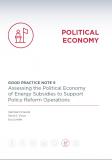Publications
RISE 2018 charts global progress on sustainable energy policies and shows that policies matter – they are a leading indicator and building block of the world’s transition to sustainable energy. The report finds that the world has seen a huge uptake in sustainable energy policies. However, progress is still far from where it needs to be for the world to reach global climate goals and the Sustainable Development Goal on Energy (SDG7). RISE 2018 rates 133 countries from 2010-17 on electricity access, renewable energy, energy efficiency and access to clean cooking to provide useful data to policymakers and help the private sector make informed decisions about investing in energy projects.
RISE 2018 is the second edition of RISE first released in 2016. As such, it follows the previous methodology of classifying countries into a green zone of strong performers in the top third, a yellow zone of middling performers, and a red zone of weaker performers in the bottom third. It also incorporates new features including policy time trends since 2010; a greater emphasis on tracking policies that support enforcement; broader coverage of the heating and transport sectors; and a pilot assessment of the policy environment for clean cooking in a dozen large access-deficit countries.
Press release | Publication page | World Bank Energy homepage
ESMAP. 2018. Regulatory Indicators for Sustainable Energy. ESMAP Report. Washington, DC: World Bank

